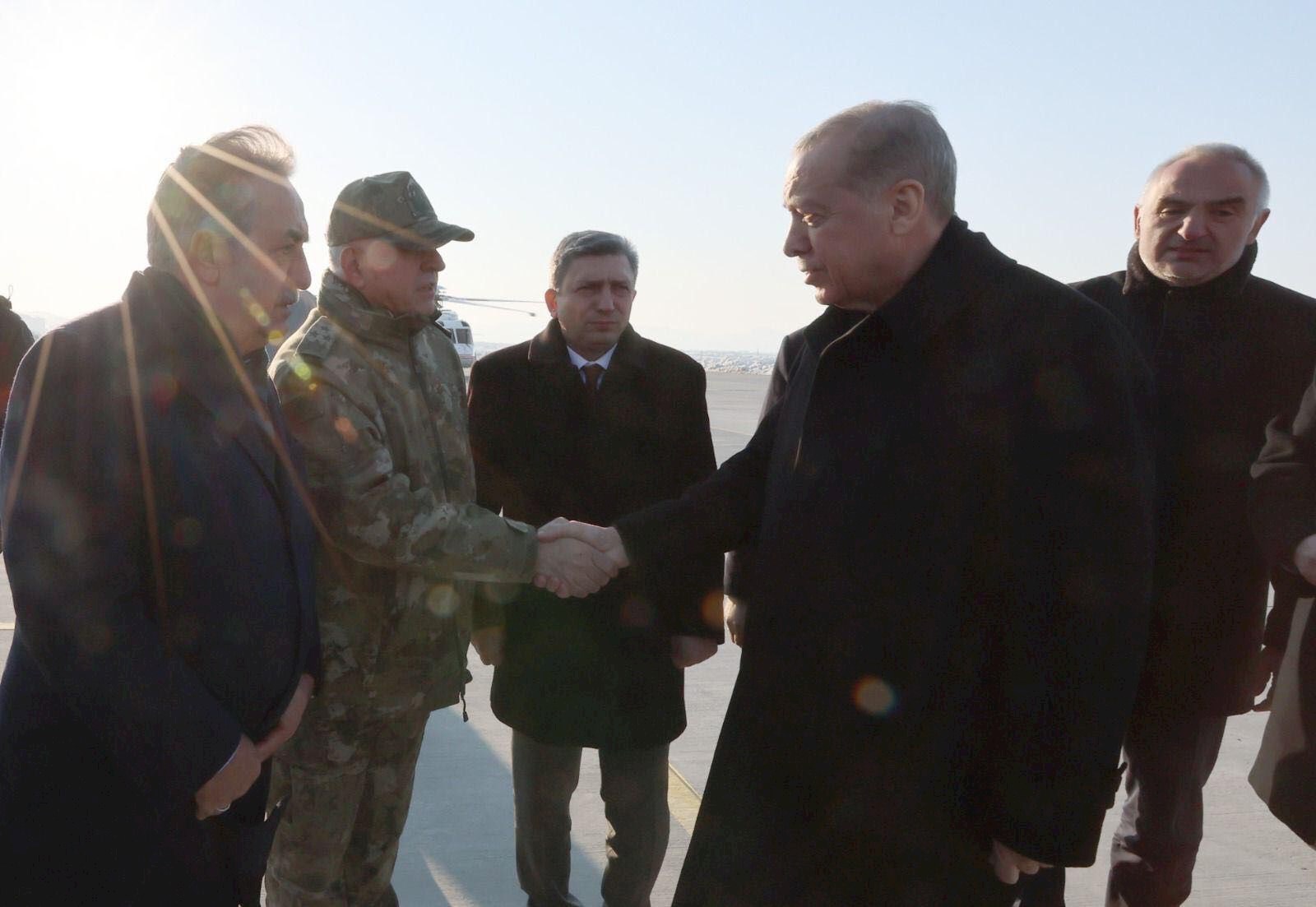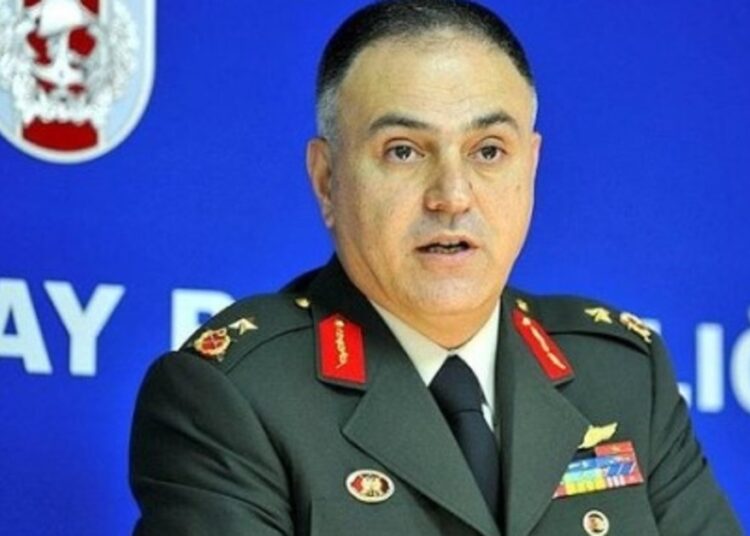Levent Kenez/Stockholm
A highly controversial general who has been linked to several questionable activities was on August 4 appointed by Turkish President Recep Tayyip Erdogan to lead NATO’s second largest armed forces.
Gen. Metin Gürak, the deputy chief of general staff, became the first man in the history of the Turkish Republic to be appointed chief of general staff without having previously held a force commander position. Following the appointment of the previous chief, Yaşar Güler, as defense minister in May, Gürak was appointed to fill the position that had been vacant for over two months.
Gürak had previously garnered attention due to his suspected role in an attempted coup on July 15, 2016, his command of Turkish troops in Libya and his association with so-called disinformation websites during his tenure as head of the general staff’s communications office.
Gürak’s name appeared for the first time in 2011 within the context of the “Internet Memorandum” case, also known as the “Internet Action Plan,” which involved the establishment of 42 disinformation websites by the General Staff with the aim of conducting activities against the government, the United States, the European Union, NGOs and minority groups. According to the indictment, a special team within the General Staff operated 42 websites that disseminated false news against the ruling party, the Gülen movement, Armenians and Kurds. These websites also frequently featured antisemitic reports.

The military aimed to portray the individuals they targeted as linked to Judaism, the CIA, Mossad or the Unification Church (Moon sect). Additionally, unfounded stories were spread about the government supporting religious fundamentalism. False reports were even circulated about then-prime minister Erdogan and Abdullah Gül, an important figure in the ruling party who would later become president, suggesting they had Jewish origins.
“Internet Memorandum” trial indictment:
The trial involving the “Internet Memorandum,” which included Gürak’s brother-in-law, then-chief of general staff İlker Başbuğ and anti-Western and ultranationalist officers among the defendants, ultimately unraveled due to collaboration between Erdogan and ultranationalist groups. Their collaboration aimed at ousting officers and officials affiliated with the Gülen movement, which Erdogan deemed a terrorist organization following corruption investigations in December 2013 that implicated him, his family members and his associates in an Iran sanctions-evasion scheme. Erdogan accused Fethullah Gülen, who inspired the movement, of initiating the graft probes, an accusation that Gülen strongly denied.
Former General Staff intelligence department chief İsmail Hakkı Pekin, who was one of the defendants, last week revealed during an interview on KRT TV that President Erdogan had gotten them released them from prison to fight against the Gülen movement.
As a result of that collaboration, the defendants who had been convicted were ultimately acquitted. Despite being questioned by prosecutors, Gürak, who was head of the General Staff’s communications department at the time, was surprisingly not included in the case.
No doubt, the most significant allegations concerning Gürak were based on his involvement in the attempted coup on July 15, 2016.
According to official documents, then-chief of general staff Hulusi Akar directed then-commander of the 4th Army Corps Gürak to investigate rumors of a coup attempt and to prevent any military activity by sending him to the Etimesgut Armored Forces School and the Land Aviation School on July 15, 2016 hours before the coup attempt was launched. However, according to the testimony of officers later tried for their involvement in the abortive putsch, Gürak and Land Forces Commander Salih Çolak did not take any action despite witnessing helicopters prepared for takeoff on the runways.

Furthermore, the Etimesgut Armored Forces School was not under Gürak’s command. While overseeing a unit that was not under his direct command, Gürak exerted no efforts to prevent his own units from getting involved in the coup attempt. On the night of the coup attempt, 36 tanks moving through the streets of Ankara belonged to the 28th Mechanized Division, which was under Gürak’s command.
In an unanswered question regarding Gürak, his name appears on the assignment list that the putschists sent to all units on the night of July 15. He was noted to have been assigned to the Turkish Armed Forces Health Command. Officers who appeared on this list were subsequently tried for involvement in the coup attempt and were sentenced to life in prison.
Another intriguing aspect is that Gürak was actually detained by the putschists on the night of the coup attempt, meaning that while the putschists were assigning Gürak to a new position, they were simultaneously apprehending him.
According to eyewitness accounts, on the night of the coup attempt Gürak attempted to enter General Staff headquarters. Despite being told by sentries that there was ongoing conflict inside and it wasn’t safe for him to enter, he persisted and was subsequently detained for insisting on entering. However, if he had chosen to leave the premises with his vehicle and accompanying security detail, he wouldn’t have been detained and could have worked to suppress the coup attempt.
Many believe that the failed coup was a false flag organized by Turkish intelligence, following which Erdogan built an authoritarian regime and assumed complete control of the judiciary and armed forces thanks to the purge of more than 150,000 civil servants and pro-NATO military officers.
In 2020 Gürak was assigned to serve in Libya, commanding the Turkish soldiers who were stationed there as part of an agreement signed between Turkey and the interim Libyan government. While Gürak’s Arab heritage and proficiency in Arabic were cited as reasons for his assignment, former officers Nordic Monitor contacted argue that he was the most suitable candidate for the Erdogan government’s covert agenda in Libya.
Turkey played a significant role in the military success of the UN-recognized Government of National Accord (GNA) against the rebel opposition led by Khalifa Haftar, a retired general who was trying to seize power in Libya. Turkey sent not only weapons, ammunition and drones but also organized Syrian mercenaries and jihadists to fight against Haftar. Moreover, on January 2, 2020, Turkey’s parliament authorized the Turkish government to send military forces to Libya following a security cooperation deal.
It’s well known that aside from his ideological alignment with the Libyan government, Erdogan has consistently emphasized the significance of Libya’s oil and gas reserves in relation to Turkey’s interests in the country. During a joint press conference with Fayez al-Sarraj, the former prime minister of the GNA, in Ankara on June 4, 2020 Erdogan unveiled his strategy regarding Libya’s oil wealth, saying, “Our goal is to enhance our collaboration, encompassing exploration and drilling activities, to tap into the natural resources within Libyan territory.”
Gürak came into the spotlight most recently after twin earthquakes devastated southern Turkey on February 6, killing more than 50,000 people according to official figures.
As the commander of the 2nd Army located in the earthquake-stricken region, he faced criticism for his soldiers’ lack of participation in relief and rescue operations. According to media reports, it was alleged that Gürak had been opposed to the president’s instruction for soldiers to remain with their units, but due to his position, he had to follow the order. However, Gürak’s appointment as chief of general staff indicates that he didn’t have much of an objection to President Erdogan’s decision at the time, since Erdogan, who is intolerant of any dissenting voices, wouldn’t have chosen him for the new role if there had been any disagreement.
As a side note, the position of chief of general staff, which had always been considered a significant force in Turkish politics, in which the military was influential in decision-making, lost its former influence due to new regulations and laws introduced after July 15, 2016. With the reorganization that put the force commands under the Ministry of Defense, the defense minister effectively assumed the de facto role of chief of general staff. Additionally, by deliberately strengthening the gendarmerie, police force and intelligence agencies, President Erdogan took measures to prevent any potential coup attempts by the military.












